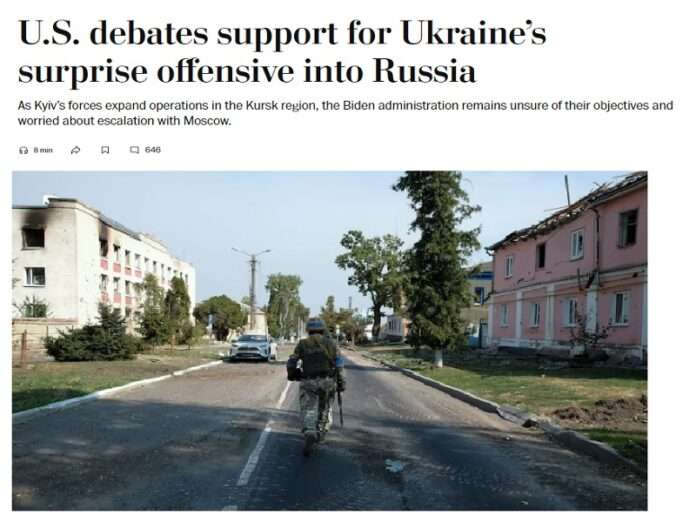The Washington Post cited unnamed administration sources to report that “U.S. debates support for Ukraine’s surprise offensive into Russia”, which suggests that some policymakers doubt that Ukraine’s invasion of Kursk advances American interests. To be sure, the US knew about this move ahead of time (if not actively participated in its planning) but didn’t thwart it, thus tacitly approving it. Nevertheless, five arguments exist for why this actually harms American interests, and they are as follows:
———-
1. Russia Might More Easily Gain Ground In Donbass
One of the reasons why Ukraine invaded Kursk was to force Russia to divert some of its forces from Donbass to this new front, yet that hasn’t happened. Instead, Ukraine diverted some of its own highly trained forces from there to Kursk, which could make it easier for Russia to gain ground in Donbass. The optics of Russia continuing to advance are already bad enough for the US’ soft power interests, but they might also adversely affect the Democrats’ electoral plans if this trend accelerates before November.
2. A Diplomatic Solution Is Now Much More Difficult
Whatever faint hopes might have previously existed of diplomatically resolving this conflict were shattered by Ukraine’s invasion of Kursk since it prompted Putin to rule out the resumption of peace talks. Some American policymakers want to “Pivot (back) to Asia” sooner rather than later in order to more muscularly contain China, ergo their interest in some sort of compromise with Russia, but that’s not possible as long as Ukraine continues occupying Russia’s universally recognized territory.
3. Ukraine Might Feel Emboldened To Expand The Conflict
Regardless of the degree to which the US might have helped plan Ukraine’s invasion of Kursk, the very fact that nothing was done to stop this despite the US obviously knowing about it in advance could embolden Kiev to further expand the conflict into Belarus, Moldova, and/or other Russian regions. It now knows that the US will go along with whatever it does regardless of some policymakers’ fear of tensions with Russia spiraling out of control, and therein lies the supreme danger.
4. Russian-US Tensions Risk Spiraling Out Of Control
Putin won’t radically respond to Ukraine’s invasion of Kursk since it hasn’t yet crossed any of his non-negotiable red lines, but in the event that it does (such as if Kiev captures more territory or expands the conflict), then Russian-US tensions could spiral out of control depending upon what he does. That scenario will remain as long as the invasion lasts, plus it raises the chances that Putin might start listening to “hardliners” and consider a radical response without any of the aforesaid lines being crossed.
5. Other US Client States Could Follow Ukraine’s Lead
The last way in which Ukraine’s invasion of Kursk actually harms American interests is that other client states might follow Ukraine’s lead by striking or invading their neighbors with whom they’re feuding in order to create a fait accompli in the expectation that the US will then feel pressured to back them up. The US doesn’t want conflicts breaking out unless it’s able to control the dynamics to a large degree, which it would struggle to do if a client state like Somalia suddenly sparked one.
———-
Despite the five arguments above about why Ukraine’s invasion of Kursk doesn’t advance American interests, nobody should get their hopes up about the US forcing its proxy to withdraw. Ukraine could also refuse any such hypothetical demand, publicly expose it to embarrass the US, and possibly expand the conflict out of spite in an attempt to provoke World War III. For these reasons, the US is unlikely to do what’s needed to end this operation, and even Trump might think twice about it if he wins.







